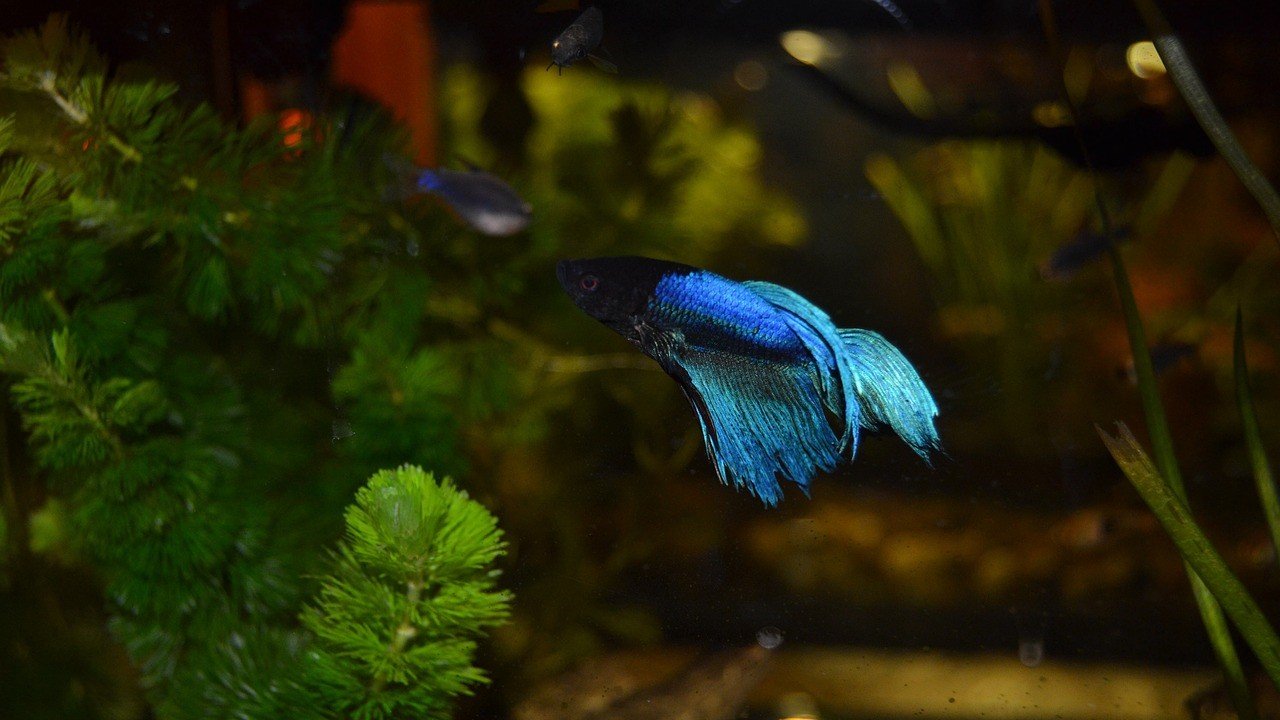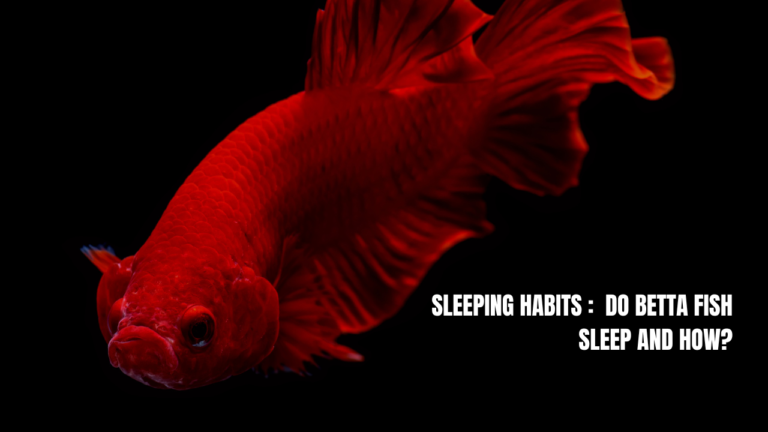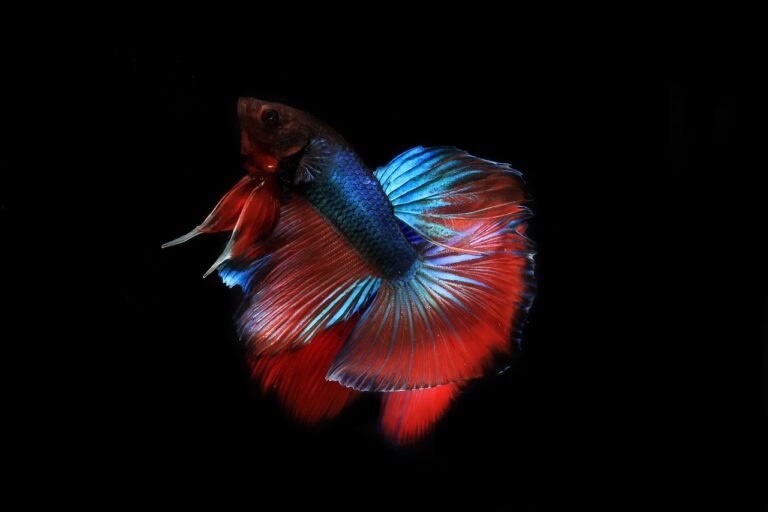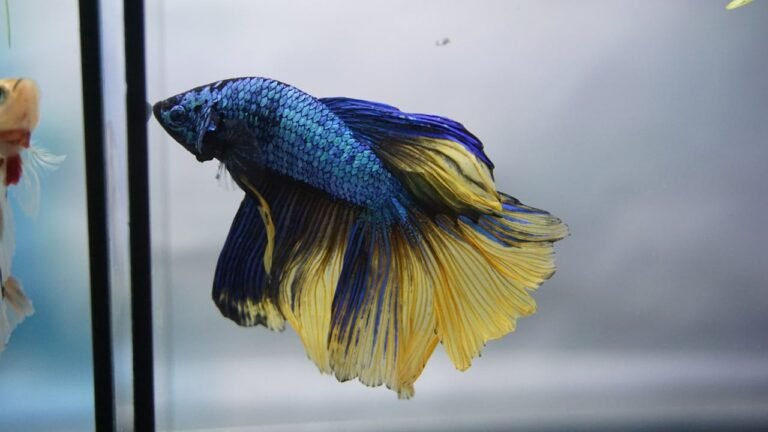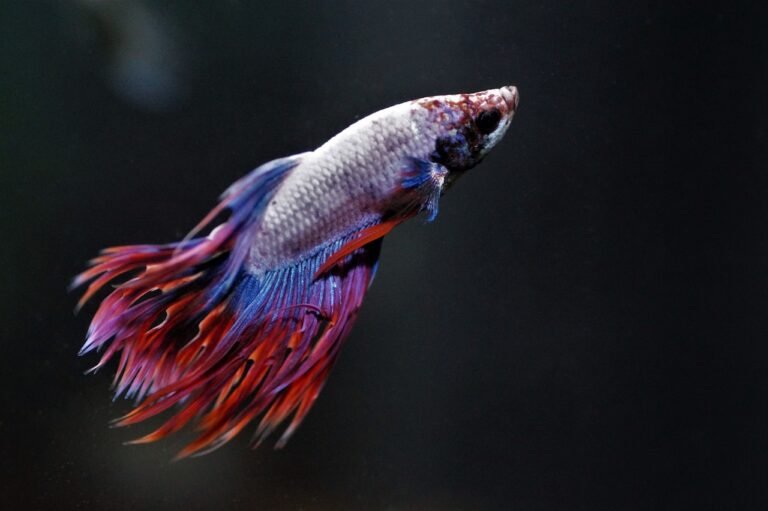If you have a betta fish, then you know how beautiful they can be. Their vibrant colors and graceful movements are mesmerizing. But have you ever wondered what lies beneath that captivating exterior? Understanding your betta’s behavior is key to building a strong relationship with them and ensuring their well-being.
Betta fish, also known as Siamese fighting fish, are famous for their striking looks and unique personalities. These tough creatures have adapted to survive in Southeast Asia’s harsh environments by developing complex behaviors that give us a glimpse into their world. By decoding these actions, you will gain valuable insights into your betta’s needs, moods, and overall health.
Every move has meaning – from sleeping patterns to bubble nests. Get ready for an exciting adventure through the realm of betta fish behavior where you will discover how to create harmony between yourself and your aquatic pal.
How Betta Fish Sleep
Have you ever wondered how your betta fish sleeps in its watery home? Well, it turns out that they don’t sleep like we do at all!
Resting Position And Methods:
Betta fish do not sleep in the traditional sense. Instead, they rest by staying still for long periods of time often wedging themselves between plants or decorations. They may look like they’re asleep during this time but actually remain aware and responsive to potential threats or disturbances around them.
Betta fish are diurnal animals which means they are active during the day and sleep at night. However, lighting conditions in the tank can affect their sleep-wake cycle as well as water temperature and general surroundings. Sometimes bettas take short naps throughout the day especially after being active or fed.
Importance of Proper Resting:
Rest is important for betta fish to conserve energy and stay healthy. Providing a calm environment with hiding spots or plants can encourage your betta to rest comfortably. Disrupting their sleep may lead to health problems over time due to stress-related issues. Knowing how bettas sleep will help you create an atmosphere that supports their natural resting behaviors so they can thrive better.
Betta Fish Flaring Gills
One of the most fascinating things about betta fish is their ability to flare its gills. This unique behavior can mean many different things from showing off for mates, defending territory or even just being scared. Let’s look at what causes this amazing action and what it could signify in our pet fishes’ lives.
Territorial Aggression:
Bettas are highly territorial animals; therefore, when they see another betta fish or its own reflection, it perceives it as a threat which leads them into flaring their gills up so as to appear larger than life thus intimidating the opponent. The gill flaring can be more or less intense depending on the male’s interest or the presence of other suitors.
Environmental Stress:
Sometimes, gill flaring is a sign of environmental stress or discomfort. This behavior can be triggered by factors such as poor water quality, high ammonia levels, or unsuitable tank conditions. If the gill flaring continues and is accompanied by other worrying signs, it may indicate that your betta’s living conditions need immediate attention.
By considering when and where your betta fish flares its gills, you can gain insights into its emotional state and possible needs. Remember that this is normal behavior but if it happens too often or lasts too long then there might be something wrong with them so take care of them accordingly.
Bubble Nest: What Does it Mean?
If you have ever seen a male betta fish blowing bubbles and creating a foamy nest at the top of his tank, then you are witnessing one of their most fascinating behaviors related to breeding instincts. Let us find out what does bubble nesting in bettas mean?
Preparation for Breeding:
When a male betta fish starts building bubble nests it means he is ready to breed.
This behavior occurs due to hormonal changes within him along with suitable environmental conditions like warm water temperature and enough hiding places for females to lay eggs safely after being fertilized by males.
Nest Building:
Male bettas construct these foam-like structures by taking mouthfuls of air from above the surface before releasing them below where they stick together forming bubbles which make up this nest called bubble nest.
Stress and Environmental Factors:
Low quality water, small tanks, lack of hiding spots or improper tank setup can all contribute to stress and aggression in betta fish. Addressing these environmental factors can help reduce fighting and promote peaceful cohabitation. To prevent or minimize fighting among your bettas, you can try the following:
- Create separate territories by providing enough hiding spots and visual barriers within the tank to prevent direct confrontation.
- Keep the water conditions optimal by doing regular water changes and monitoring the parameters.
- Ensure that each betta has enough space by using an appropriate tank size and avoiding overcrowding with incompatible tank mates.
- Introduce new fish slowly and observe their interactions closely.
- Separate aggressive individuals or breeding pairs into individual tanks when aggression is heightened.
By understanding why bettas fight and implementing appropriate solutions, you can create a harmonious environment for your finned friends where they can thrive without unnecessary conflicts.
Fighting Behavior: Reasons and Solutions
Betta fish, aptly nicknamed “Siamese fighting fish,” are known for their aggressive tendencies, particularly when it comes to defending their territory or competing for mates. Understanding the reasons behind their fighting behavior and implementing effective solutions can help prevent unnecessary conflicts and ensure a peaceful environment for your finned friend.
- Territorial Disputes:
- Betta fish are highly territorial and will aggressively defend their claimed space from perceived intruders, including other bettas or even their own reflections.
- Overcrowding or introducing new fish to an established tank can trigger territorial disputes and lead to fighting.
- Breeding Behavior:
- During the breeding season, male betta fish become especially aggressive towards other males, as they compete for the attention of females and defend their carefully constructed bubble nests.
- This heightened aggression is driven by hormonal changes and the instinct to protect their potential offspring.
- Stress and Environmental Factors:
- Poor water quality, inadequate tank size, lack of hiding spots, or improper tank setup can contribute to increased stress levels and aggressive behavior in betta fish.
- Addressing these environmental factors can help mitigate fighting tendencies and promote a more peaceful coexistence.
To prevent or minimize fighting behavior in your betta fish, consider the following solutions:
- Provide ample hiding spots and visual barriers within the tank to create separate territories and reduce direct confrontation.
- Maintain optimal water conditions by performing regular water changes and monitoring water parameters.
- Ensure adequate tank size and avoid overcrowding by housing bettas individually or with compatible tank mates.
- Introduce new fish gradually and monitor their interactions closely.
- Consider separating aggressive individuals or breeding pairs into individual tanks during periods of heightened aggression.
By understanding the reasons behind betta fish fighting behavior and implementing appropriate solutions, you can create a harmonious environment where your finned companions can thrive without unnecessary conflicts.
Behavior Before Death: Signs to Watch Out For
As responsible owners of betta fish, it is important for us to know what signs may indicate that our beloved pets are nearing the end of their lives. Although this is never easy to think about, recognizing these behaviors will enable us to provide them with utmost care during their last days on earth.
Loss of Appetite:
One of the earliest indications that a betta fish’s health is deteriorating is when it starts eating less or stops eating altogether. They may show disinterest in food or struggle to eat even if offered their favorite treats. This could be due to various underlying health problems or simply because they are getting old.
Lethargy and Inactivity:
Normally, healthy bettas are active creatures which respond quickly but as they approach death; they become more lethargic and inactive day after day.
They spend most time resting at the bottom of the tank or in one corner with little movement or response towards external stimuli such as tapping on glass etcetera .
This lack of energy and liveliness is a clear indication that their condition is worsening.
Deterioration of Physical Appearance:
When betta fish are about to die, there are usually some noticeable changes in their physical appearance.
The vibrant colors may fade away and the fins become ragged or clamped close to the body.
Sometimes white or fuzzy growths appear which could be signs of fungal or bacterial infections.
Though these symptoms can be disturbing, it’s important to stay alert and provide your betta with a comfortable stress-free environment during its last days. You may also consider seeking advice from a vet or experienced aquarist on how best to care for them until they pass on.
Also Read : How Long Do Betta Fish Live
Can Betta Fish See in the Dark?
Being nocturnal animals, betta fish have developed abilities to move around and hunt under low light conditions. But how good is their night vision? Knowing what they can see when it’s dark will enable you to create an ideal environment for your pet fish.
Betta Fish Vision and Light Perception:
Betta fish have eyes that are designed for seeing in dim light. They contain more rod cells than other types of cells which helps them detect movement and shapes even when there isn’t much light around them. Also, they possess tapetum lucidum – a reflective layer that enhances their ability to gather and utilize available light energy.
Hunting at Night:
Since they are nocturnal hunters by nature, bettas rely on their eyesight greatly during dark hours when searching for food becomes challenging due to limited visibility underwater. With this keen vision, they can easily spot any slight movement made by insects or brine shrimps which may enter into their territory. Such an adaptation gives them an upper hand over diurnal fish species that might find it difficult to hunt effectively at night.
Tank Lighting Considerations:
Even though bettas can see in darkness, it is still important to provide them with a natural day/night cycle and appropriate lighting conditions. You can achieve this by using a dimly lit or blue-tinted aquarium light during evening hours so as to mimic their natural habitat. However, keeping them in complete darkness for long periods may stress them out and disrupt normal activities.
By understanding the unique visual capabilities of your betta fish, you will be able to create an environment that caters for its nocturnal nature while ensuring it gets proper lighting for overall health.
Sleeping Patterns and Behaviors
Despite being known for their lively nature and bright colors, bettas also need enough sleep in order to stay healthy. Knowing how they sleep and what they do when resting will help you provide a good sleeping place for your pet fish.
Daytime Sleepers:
Bettas are active during the day meaning they sleep at night like most other animals do. However, it is not rare for betta fish to take short naps or periods of inactivity throughout the day, especially after a meal or during low activity times.
Resting Positions:
- When it comes time to rest, betta fish may assume different resting positions depending on their individual preferences and the tank setup.
- Some may wedge themselves between plants or decorations while others may simply rest on the substrate or leaf litter at the bottom of the tank.
- It is important to provide plenty of hiding spots and secure resting areas to foster a sense of safety and security during sleep.
Importance of Undisturbed Sleep:
- Like many other animals, betta fish need uninterrupted sleep in order to recharge and maintain overall health.
- Disruptions or disturbances during rest periods can lead to stress, lethargy, and potential health problems over time.
- It is recommended that unnecessary noise, vibrations, or disturbances be minimized around the tank especially during nighttime hours.
By understanding and respecting your betta fish’s sleeping patterns and behaviors you can create an environment that promotes restful slumber and contributes to their overall well-being. Watch your betta’s unique preferences and adjust their living conditions accordingly.
Do Betta Fish Have Teeth?
Being curious owners of betta fish, you might have wondered about different parts of these fascinating creatures. One area that often raises questions is their dental structure – do bettas have teeth and if yes what are they used for?
Betta Fish Dental Anatomy:
Like many other species of fish, bettas do have teeth but not like those found in mammals.Instead of individual teeth, they possess rows of small sharp projections known as pharyngeal teeth or throat teeth.These teeth are in the back of their throat, not their mouth. They use them to hold and grind food.
Betta Fish Teeth Function:
- The main purpose of betta fish teeth is to help digest prey.
- When a betta fish catches its prey, such as live insects or brine shrimp, the pharyngeal teeth help grip and secure it.
- As the food moves through the digestive system, these teeth crush and break down the prey so that it can be more easily digested and absorbed as nutrients.
Dental Care for Betta Fish:
- Unlike mammals, betta fish do not need special dental care or cleaning.
- Their teeth are constantly replaced as they wear out so there is always a supply of sharp working teeth available.
- However, it is important to feed them a balanced diet and avoid overfeeding because too much food can cause digestive problems or blockages.
- Knowing about betta fish’s unique dental structure not only satisfies our curiosity but also makes us realize how wonderfully adapted these amazing creatures are for living in water.
Tips for Observing and Interacting with Betta Fish
Betta fish are captivating creatures; watching their behavior can be both rewarding and educational. To build a strong relationship with your finned friend while ensuring its welfare, it is important to approach interactions with care and respect. Here are some tips for effective observation and interaction with your betta fish:
Establish a Routine:
Betta fish thrive on routine and consistency so try to establish regular feeding times as well as tank maintenance activities such as water changes etcetera. Interaction should also be done at specific times each day if possible. This predictability can help reduce stress levels among these pets thereby allowing them to exhibit natural behaviors which will enable you to watch them when they are most comfortable.
Minimize Disturbances:
- Sudden movements, loud noises or vibrations can startle and stress betta fish which may result in erratic or defensive behavior.
- When observing or interacting with your betta, move slowly and avoid tapping on the glass or making sudden gestures.
- Consider placing the tank in a quiet area where there is less traffic so as to reduce external disturbances that could interfere with their peace during sleep time.
Provide Enrichment:
- Betta fish are intelligent creatures that need mental stimulation from their environment.
- You can introduce safe non-toxic decorations, plants or toys that encourage natural behaviors like exploring, hiding or bubble nest building.
- Watching your betta interact with these enrichments will give you an idea of its personality traits and preferences.
Respect Personal Space:
Although they can be interactive and responsive to owners, it is important to respect the personal space of betta fish. Do not tap on the glass or make sudden movements near the tank as this may be seen as a threat causing stress which leads to defensive behavior by these pets. Let them come close on their own terms without trying to handle them unless necessary for health reasons such as when treating diseases etcetera.
Monitor Water Quality:
Good water quality is essential for healthy living conditions of any aquarium inhabitant including bettas; it also affects their behaviour patterns too. By following these tips and being respectful and attentive, you can build a stronger relationship with your betta fish and gain insight into their unique personalities and behaviors.
Takeaways for Creating a Bond with your Betta Fish
Understanding the behavior of betta fish is not only educational but also helps to create a deeper connection with them. This is because it allows you to know more about your friend. You will be able to take care of them better if you understand why they behave in certain ways such as sleeping or showing territoriality among others.
In this guide we have looked at different aspects of betta fish behavior which has helped us understand what they mean by doing so. For example, bubble nests are built by males when they want to mate while gill flaring is done by both sexes during aggressive encounters.
As you continue watching and interacting with your betta fish, always approach them patiently, respectfully and genuinely interested in knowing their world better. Create for them an environment that meets all their needs like enough hiding places, proper lighting system as well as clean water conditions within the tank setup.
Take advantage of these behaviors exhibited by your bettas as learning opportunities where each one shows its own character traits. Appreciate those funny moments when it tries hard to survive against all odds or even when it stares at you for long hours without blinking an eye.
By understanding and appreciating our pet’s behavior we strengthen our bond with them thus making their lives more enjoyable too. This will also enable us to discover many other interesting things about underwater life through this amazing journey together with our little friends having fins on them.

